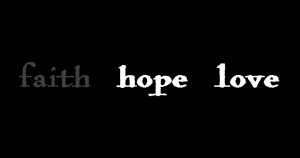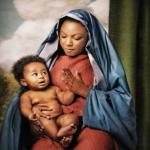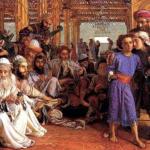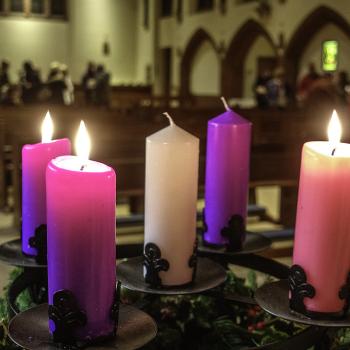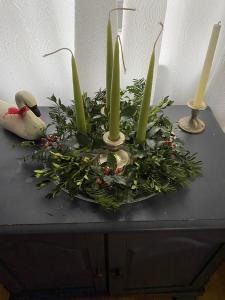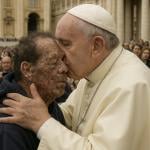The Scriptures sacred to Christians say “These three abide: faith, hope and love; but the greatest of these is love.” [1 Cor. 13:13]
What happens for persons in whom faith no longer abides? Can they still practice hope and love?
A few weeks ago, friends who find they have lost their faith wrote of still setting up their Advent wreaths and candles out of lifelong habit and custom. But they were asking themselves why they were doing it.
Christianity acknowledges faith, hope and love as the three theological virtues. They are abilities whose origin is theological, that is, they come from God; their motive is God, and their object, their goal, is God.
For Christian faith, the Advent season has the motive and goal of making ready for the Second Advent (Second Coming) of Christ the Incarnate Son of God and making ready for Christmas, the yearly commemoration of Christ’s human birth in Bethlehem two thousand years ago. [At a deeper level, Advent does not make us ready for Christmas. It is the other way around: keeping Christmas and the rest of the Church year is part of how we make ready for the Advent of Christ’s Second Coming.]
Can those who no longer believe in God go on making use of Christian cultural observances and artifacts like the Advent wreath or the Christmas tree? If such persons do, I think they will invest those things with meanings, motives and goals that are no longer theological.
If theological faith were the only issue, then one would just need to stop observing Advent. But what about an Advent season of hope and love, particularly a hope and love that are non-theological?
Two out of three: the theological and non-theological versions of hope and love.
Paragraph 1817 of the official Catechism of the Catholic Church says: Hope is the theological virtue by which we desire the kingdom of heaven and eternal life as our happiness, placing our trust in Christ’s promises and relying not on our own strength, but on the help of the grace of the Holy Spirit.
But the Catechism’s next paragraph adds an anthropological assertion that can be appealing even if one does not believe in God: The virtue of hope responds to the aspiration to happiness which God has placed in the heart of every man….
So one could set up a wreath to keep a season marking the natural human hope for the advent of happiness. This hope is present in every human heart, whether or not one has faith in God.
And love?
Calling love “charity,” the Old English word derived through French from Latin, paragraph 1822 of the Catechism says: Charity is the theological virtue by which we love God above all things for his own sake, and our neighbor as ourselves for the love of God.
Going on, the Catechism says in paragraph 1827: The practice of all the virtues is animated and inspired by charity, which binds everything together in perfect harmony….
Practicing such love or charity, then, even without a theological motive and a theological goal, will involve service, generosity, altruism, moving ideally towards an advent of harmony and peace.
Even in the absence of the theological virtue of faith, one can still nobly celebrate, pursue and practice hope and love as earthly, human and humane virtues.
To the shame of us who have the Christian faith, many who used to have it, but no longer do, and many who have never been Christians were and still are scandalized to see those who profess the Christian faith acting without theological love, without charity, without service, without generosity, without altruism, but acting instead with selfishness, cruelty and even hatred.
Those who never had theological faith, or who have lost it, but are observing an Advent this year and for years to come— with lively hope for happiness and with a committed, effective practice of love for their fellow human beings— deserve the veneration of us Christians, for we must still love them, and we can still have faith and hope that Christ will bless them at the advent of his Second Coming in his glory, even if they never recognized or no longer recognize him as “Lord.”
In the twenty-fifth chapter of the holy Gospel according to Matthew, Jesus said:
When the Son of man comes in his glory, and all the angels with him, then he will sit on his glorious throne. Before him will be gathered all the nations, and he will separate them one from another as a shepherd separates the sheep from the goats, and he will place the sheep at his right hand, but the goats at the left. Then the King will say to those at his right hand, ‘Come, O blessed of my Father, inherit the kingdom prepared for you from the foundation of the world; for I was hungry and you gave me food, I was thirsty and you gave me drink, I was a stranger and you welcomed me, I was naked and you clothed me, I was sick and you visited me, I was in prison and you came to me.’ Then the righteous will answer him, ‘Lord, when did we see thee hungry and feed thee, or thirsty and give thee drink? And when did we see thee a stranger and welcome thee, or naked and clothe thee? And when did we see thee sick or in prison and visit thee?’ And the King will answer them, ‘Truly, I say to you, as you did it to one of the least of these my brethren, you did it to me.’ And the righteous will go into eternal life.
Hope and love!
Two out of three are not bad.
Rather, they can be most worthy of eternal blessing.

